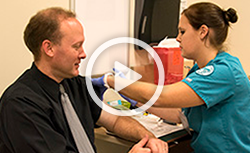Seasonal Flu, Hepatitis B, MMR, and TDAP (tetanus, diphtheria and pertussis) vaccines
are given throughout the semester by appointment. We can draw your blood to check
for immunity (titers) for Hepatitis B, MMR and Varicella.
Influenza

NMWC Flu Shots

CDC Flu Information
Tdap
All adults who have never received one should get a shot of Tdap, followed by a Td
(tetanus) or TDAP booster every 10 years. Diphtheria and pertussis spread from person
to person. Tetanus enters the body through cuts or wounds.
- TETANUS (T) causes painful stiffening of the muscles. Tetanus can lead to serious health problems,
including being unable to open the mouth, having trouble swallowing and breathing,
or death.
- DIPHTHERIA (D) can lead to difficulty breathing, heart failure, paralysis, or death.
- PERTUSSIS (aP), also known as “whooping cough,” can cause uncontrollable, violent coughing which
makes it hard to breathe, eat, or drink. Pertussis can be extremely serious in babies
and young children, causing pneumonia, convulsions, brain damage, or death. In teens
and adults, it can cause weight loss, loss of bladder control, passing out, and rib
fractures from severe coughing.
Tdap - CDC Information
Vaccine Information Statement (VIS) - TDAP (Tetanus Diphtheria & Pertussis)
MMR (Measles, Mumps & Rubella)
Measles is one of the most contagious of all infectious diseases; up to 9 out of 10
susceptible persons with close contact to a measles patient will develop measles.
The virus is transmitted by direct contact with infectious droplets or by airborne
spread when an infected person breathes, coughs, or sneezes. Measles virus can remain
infectious in the air for up to two hours after an infected person leaves an area.
MMR vaccine can prevent measles, mumps, and rubella.
- MEASLES (M) can cause fever, cough, runny nose, and red, watery eyes, commonly followed
by a rash that covers the whole body. It can lead to seizures (often associated with
fever), ear infections, diarrhea, and pneumonia. Rarely, measles can cause brain damage
or death.
- MUMPS (M) can cause fever, headache, muscle aches, tiredness, loss of appetite, and
swollen and tender salivary glands under the ears. It can lead to deafness, swelling
of the brain and/or spinal cord covering, painful swelling of the testicles or ovaries,
and, very rarely, death.
- RUBELLA (R) can cause fever, sore throat, rash, headache, and eye irritation. It can
cause arthritis in up to half of teenage and adult women. If a woman gets rubella
while she is pregnant, she could have a miscarriage or her baby could be born with
serious birth defects.
MMR vaccine is safe - Two doses of MMR vaccine are about 97% effective at preventing measles; one dose
is about 93% effective.
Vaccine Information Statement (VIS) - MMR (Measles, Mumps & Rubella)
Hepatitis B
Hepatitis B is a serious disease caused by a virus that attacks the liver. The virus,
which is called hepatitis B virus (HBV), can cause lifelong infection, cirrhosis (scarring)
of the liver, liver cancer, liver failure, and death.
What is hepatitis?
Hepatitis means inflammation of the liver. When the liver is inflamed or damaged,
its function can be affected. Heavy alcohol use, toxins, some medications, and certain
medical conditions can all cause hepatitis. However, hepatitis is often caused by
a virus. In the United States, the most common hepatitis viruses are hepatitis A virus,
hepatitis B virus, and hepatitis C virus.
The hepatitis B virus is spread when blood, semen, or other body fluid infected with
the hepatitis B virus enters the body of a person who is not infected. Health Care
Workers and Students are at greater risk of exposure to Hepatitis B Virus.
People can also become infected with the virus from:
- Birth (spread from an infected mother to her baby during birth)
- Sex with an infected partner
- Sharing needles, syringes, or drug preparation equipment
- Sharing items such as toothbrushes, razors or medical equipment such as a glucose
monitor with an infected person
- Direct contact with the blood or open sores of an infected person
- Exposure to blood from needlesticks or other sharp instruments of an infected person
Hepatitis B virus is not spread through food or water, sharing eating utensils, breastfeeding, hugging, kissing,
hand-holding, coughing, or sneezing.
Hepatitis B - CDC Information
Vaccine Information Statement (VIS) - Hepatitis B
Varicella (Chickenpox)
(Varicella vaccine is NOT available at the NMWC)
Chickenpox can cause an itchy rash that usually lasts about a week. It can also cause
fever, tiredness, loss of appetite, and headache. It can lead to skin infections,
pneumonia, inflammation of the blood vessels, and swelling of the brain and/or spinal
cord covering, and infections of the bloodstream, bone, or joints. Some people who
get chickenpox get a painful rash called shingles (also known as herpes zoster) years
later.
Chickenpox is usually mild but it can be serious in infants under 12 months of age,
adolescents, adults, pregnant women, and people with a weakened immune system. Some
people get so sick that they need to be hospitalized. It doesn’t happen often, but
people can die from chickenpox.
Varicella - CDC Information
Vaccine Information Statement (VIS) - Varicella
COVID-19 Vaccine
Healthcare workers and students are at risk of acquiring and transmitting SARS-CoV-2
infection to vulnerable and immunocompromised individuals. COVID-19 vaccination is required by many health facilities which provide clinical
placement for ACM students in academic health professions.
Getting Your COVID-19 Vaccine
Overview of COVID-19 Vaccines






